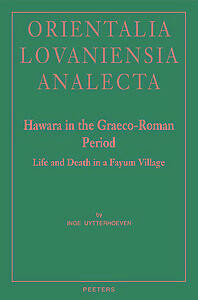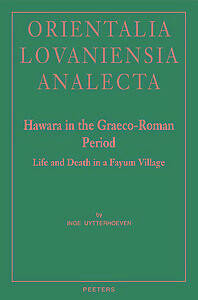
Je cadeautjes zeker op tijd in huis hebben voor de feestdagen? Kom langs in onze winkels en vind het perfecte geschenk!
- Afhalen na 1 uur in een winkel met voorraad
- Gratis thuislevering in België vanaf € 30
- Ruim aanbod met 7 miljoen producten
Je cadeautjes zeker op tijd in huis hebben voor de feestdagen? Kom langs in onze winkels en vind het perfecte geschenk!
- Afhalen na 1 uur in een winkel met voorraad
- Gratis thuislevering in België vanaf € 30
- Ruim aanbod met 7 miljoen producten
Zoeken
Hawara in the Graeco-Roman Period
Life and Death in a Fayum Village. with an Appendix on the Pottery from Hawara by Sylvie Marchand
I Uytterhoeven
€ 223,95
+ 447 punten
Omschrijving
In the 12th Dynasty pharaoh Amenemhat III (ca. 1842-1797 BC) built his pyramid at Hawara, a site near the entrance of the Egyptian Fayum oasis. From that time into the Graeco-Roman Period the pyramid and funerary temple of Hawara, the so-called Labyrinth of the ancient sources, as well as its extended necropolis would attract numerous adherents of the cult for Pramarres, the deified Amenemhat III, and many other visitors. The source material available for the village and necropolis of Hawara covers a period of almost 3000 years, reaching from the 12th Dynasty (ca. 1800 BC) to the Arab Period (10th century AD). Thanks to the many archaeological data, literary texts, inscriptions and papyri Hawara forms an ideal case study for the interdisciplinary research of an Egyptian site. Taking the sources related to the Graeco-Roman occupation phase of Hawara as a starting point, this monograph offers a picture of life and death in this Fayum village. The part dealing with the living pays attention to the topographical situation of the village, its population, administration, economy and religious life. The second part focuses on the dead who were buried on the site by reconstructing their socio-economic position and provenance.
Specificaties
Betrokkenen
- Auteur(s):
- Uitgeverij:
Inhoud
- Aantal bladzijden:
- 1110
- Taal:
- Engels
- Reeks:
- Reeksnummer:
- nr. 174
Eigenschappen
- Productcode (EAN):
- 9789042920330
- Verschijningsdatum:
- 1/12/2009
- Uitvoering:
- Hardcover
- Formaat:
- Genaaid
- Afmetingen:
- 165 mm x 249 mm
- Gewicht:
- 2199 g

Alleen bij Standaard Boekhandel
+ 447 punten op je klantenkaart van Standaard Boekhandel
Beoordelingen
We publiceren alleen reviews die voldoen aan de voorwaarden voor reviews. Bekijk onze voorwaarden voor reviews.









